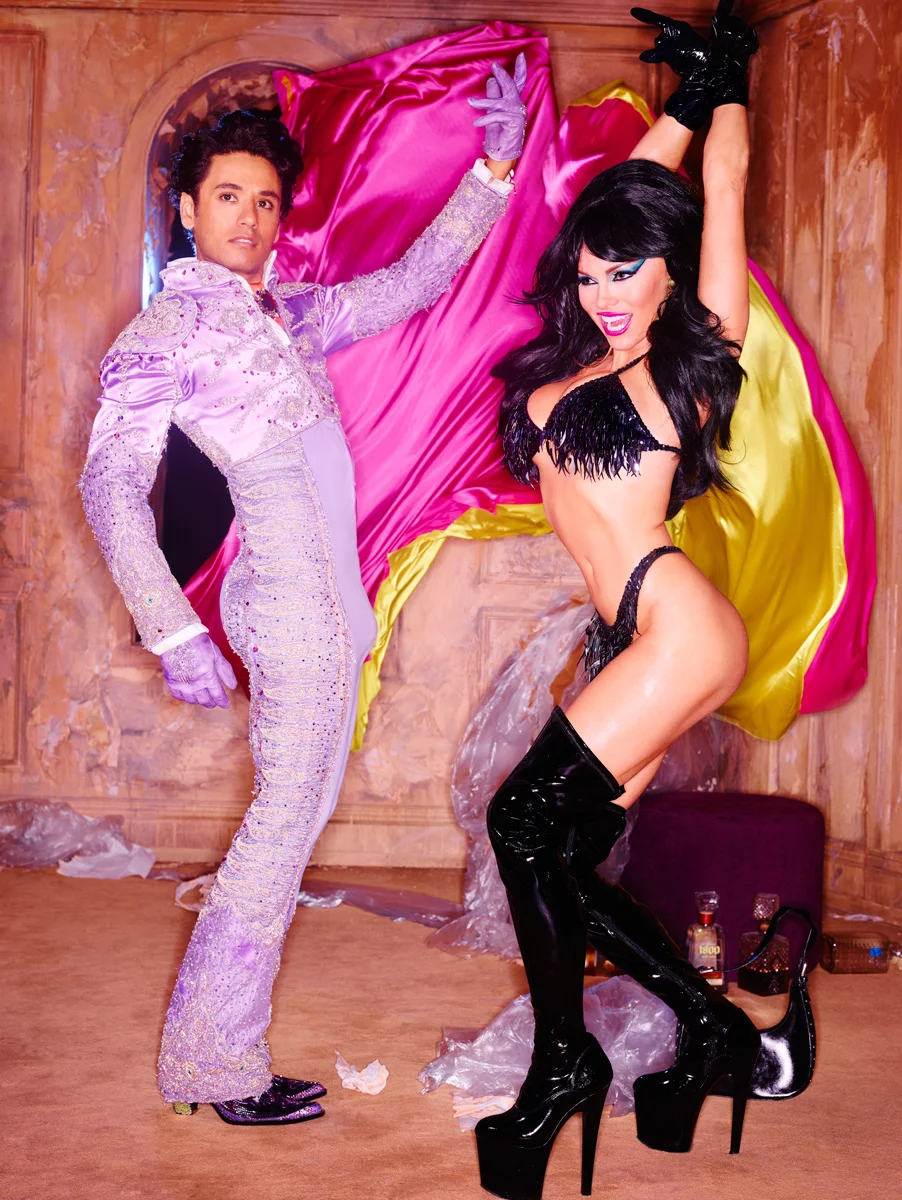
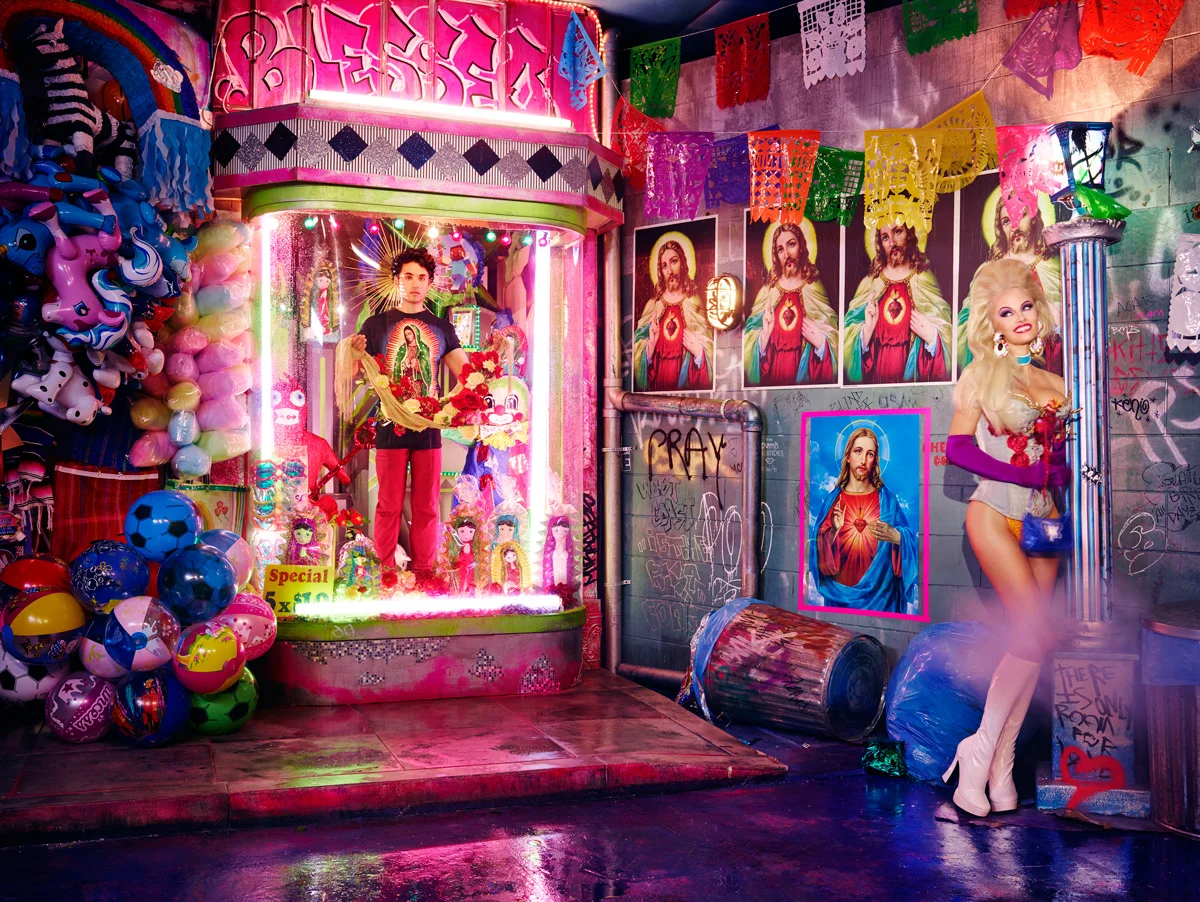
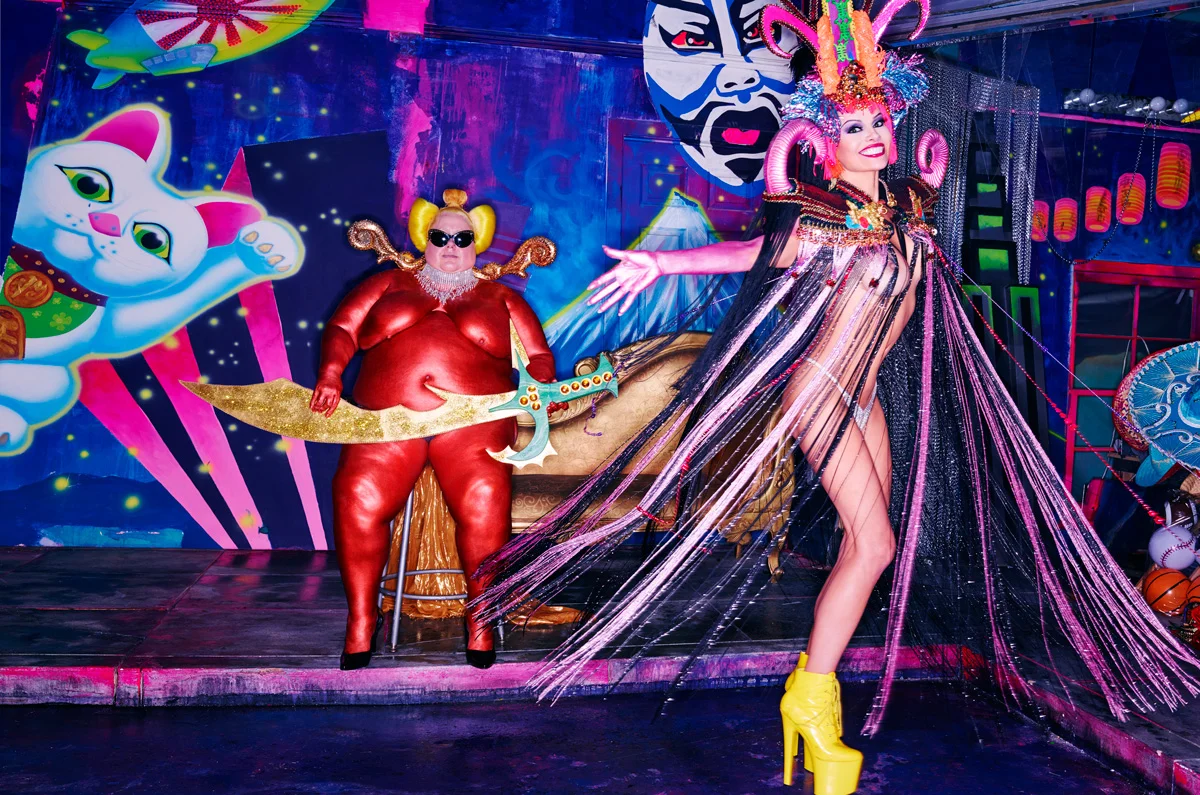
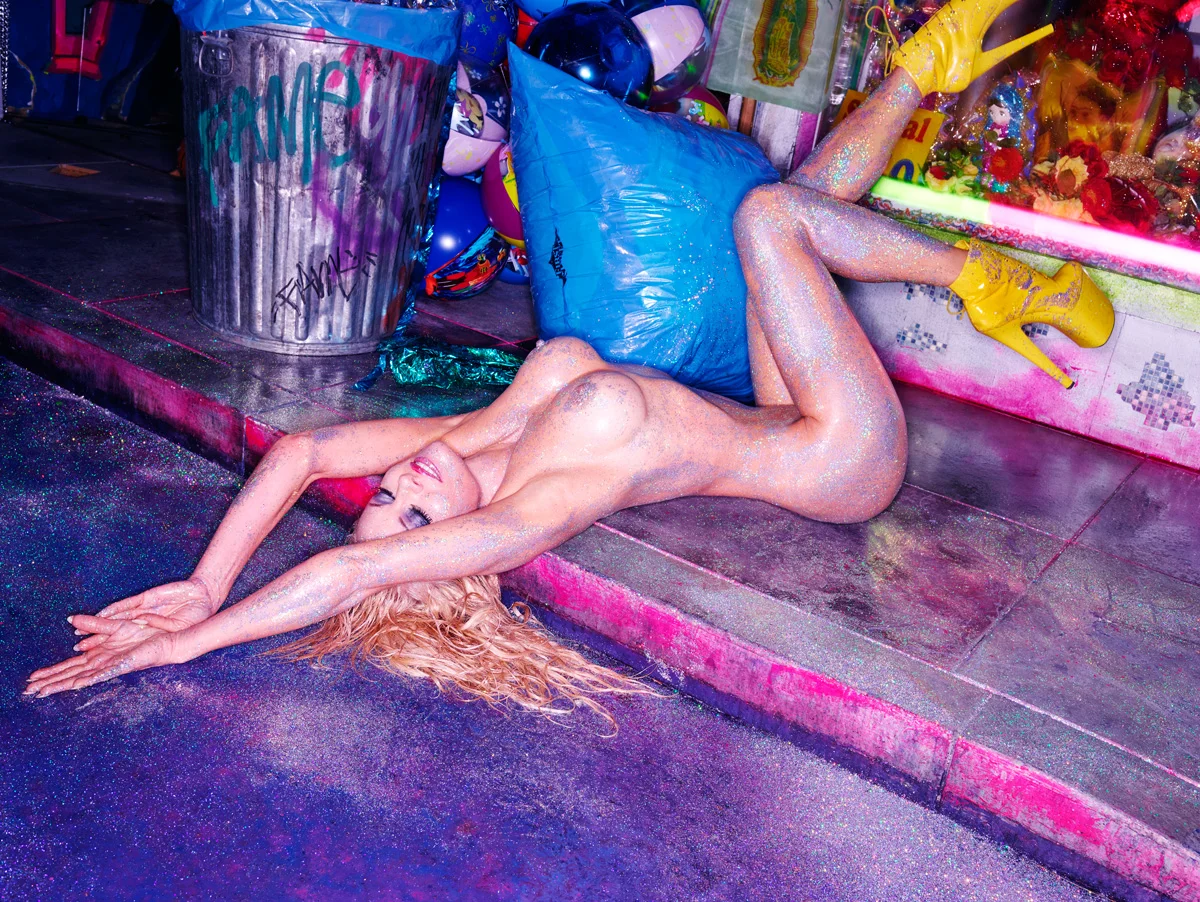
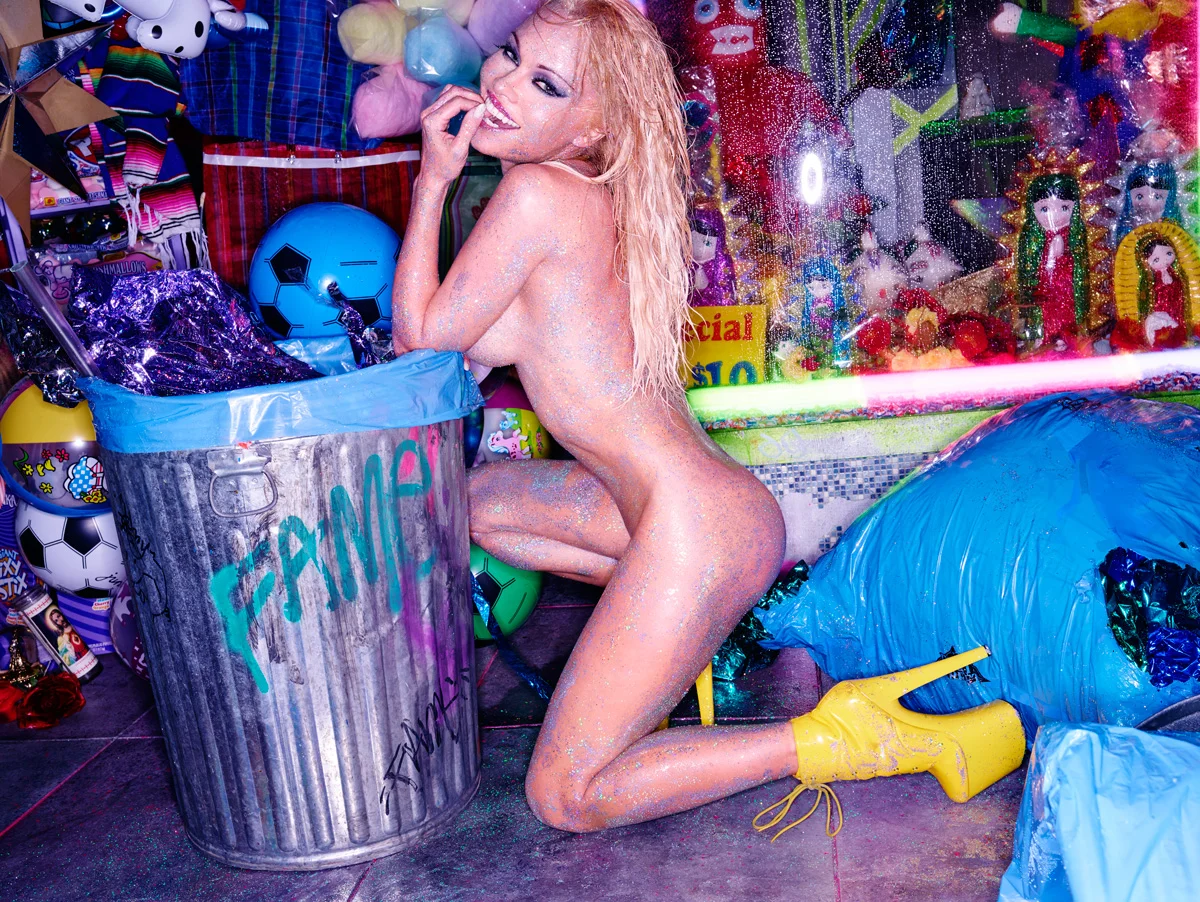
[](#)[](#)
Pamela Anderson
And I Said, What About Breakfast at Pamela's?
With a pewter flash of ocean, the road to Malibu ejects my car out of the curling concrete tunnel at the end of the I-10, straight onto the six-lane, ocean-hugging Pacific Coast Highway. Ah, the first fleeting glance at the L.A. coastline, and the squat, flimsy structures that are instantly recognizable silhouetted above the sand—lifeguard huts, just like the ones that used to be on _Baywatch_.
There’s a dizzying surreality in having that spark of recognition, and in the same instant knowing that you are on your way to interview the very beach babe that made those little huts famous: Pamela Anderson.
“\[Hut\] number 14—that was mine,” she will later tell me.
I meet Anderson for breakfast at her elegant Malibu home. The gate is unlocked and I can’t find the bell, so I poke my head into the courtyard. The very friendly Anderson greets me, along with an even friendlier pair of golden retriever puppies. She’s dressed in a white cotton tunic, and tells me she had just rolled out of bed—a look that she pulls off with considerable panache.
Anderson is a seminal icon of the ’90s—that red bathing suit, that bleach-blonde hair—a totem of pre-9/11 innocence, when Arnold Schwarzenegger could still just beat up the bad guys, and when Anderson and David Hasselhoff could rescue errant swimmers with nothing more than a slow-mo sprint across the sand, and some brisk freestyle strokes into what were always surprisingly calm seas. Sometimes mouth-to-mouth followed.
After discovery via Jumbotron at a football game in Canada, it was _Playboy_ that put Pamela Anderson on her first ever aeroplane flight, and brought her to Los Angeles. The city exceeded her expectations. “I had no idea what I was in for,” she recalls, “I landed on gay pride day, and I thought I had arrived on the moon! I called my Mom and told her: ‘not only do gay people exist, but they run around in pink hot pants, handcuffed together!’ And I’m like, ‘I think this is where I belong.’”
Anderson has starred in three major television series, and several movies, and this year will appear in the separate indie film projects of notable talents Alex Israel, Luke Gilford, and Nadia Litz. As an activist she has championed numerous causes, both under the auspices of her Pamela Anderson Foundation, and by spearheading high profile campaigns for organisations like PETA and Sea Shepherd.
When I ask Anderson about the guiding magnetism of her moral compass, she points to her Finnish grandfather, a logger who loved the Canadian wilderness. Anderson grew up on the beach—but not in Californian sunshine, rather on cold but beautiful Vancouver Island. These modest small-town roots proved vital when her fame and public persona began to bleed into the edges of her more down-to-earth self.
“When Tommy \[Lee, her first husband, and the drummer of Mötley Crüe\] and I were together,” she tells me, “and I was wearing rubber and he was beating up photographers, and I’m swearing, telling everyone to ‘F off,’ slowly I became this cartoon image—it became this kind of debaucherous cartoon character, but really the next day I was the woman at the school, getting the kids in the car, and kind of judging other people opening up their car doors to get their kids out—when I’m seeing a peanut butter sandwich on the floor of their car and thinking ‘Oh, this says a lot about that person,’ but then I’d shut the window and see my reflection, with glitter and my eyelashes sideways.”
Anderson credits her children and her strong sense of family for keeping her intact, “it probably saved my life because I’ve been in crowds and circles and I’ve gone a little wild, but I always make it home for my kids.” She is incredibly proud of her children, both of whom are on the cusp of adulthood.
“I’m trying to raise gentlemen here,” she tells me, “but you know L.A.’s tough. This is very seductive, this industry. I didn’t let them go to school here.”
As Pamela shows me around her beautiful home—one that she built and designed from scratch—her two boys ascend the stairs. They’re keen to go out on an adventure, but the younger one’s tutor has arrived for a lesson he’s forgotten about.
Anderson has a charmingly frank conversation with him, “An hour and a half of your day. If you can change it you can, if not you can pay for it.”
The boys descend the stairs and it’s unclear which way the cards have fallen. “I hope he sucked it up and did it.” She later ponders aloud, “What do you think are the chances?”
Recalling my own reticence in studying, I suggest to her that chances are not that good. Anderson opines it’s 50/50.
Sheltering her children from the murkier undercurrents of the Hollywood backwash is seemingly her proudest achievement, and it’s easy to see why—Anderson’s level of fame can bring incredible darkness with it. She tells me about an extreme example: “A homeless person went into my home and was living in my guest house with my _Baywatch_ bathing suit on, slicing her wrists. She had a letter that said ‘I’m not a lesbian I just want to touch you.’ She got my bathing suit out of my room, I was there alone with two babies and I remember seeing a face in a window—isn’t it the scariest thing you can think of?—you walk up to a dark window and you’re like,” Anderson gasps, and lifts her hands as though in surprise, “I called security who couldn’t find her, and then she was in my house. Things kept going missing, where’s that loaf of bread, where’s my jean jacket, and I’d be like ‘am I going crazy?’ She was there for three or four days.”
For breakfast, Anderson and I feast on fresh berries and a truly delicious vegan banana bread she baked (the secret ingredient is champagne). She has recently been devoting a lot of her time to popularizing vegan cooking, and many of these efforts are documented on her website, as well as in an upcoming cookbook she’s writing based on her culinary show, _The Sensual Vegan._
Traversing Anderson’s highly active personal blog, one finds everything from free-form poetry, to eloquent letters to Russian Environment Ministers. One of the most striking things about Anderson is the extent of her activism—both in terms of the amount of her energy she invests in it, and the breadth of her causes.
In a world where too many celebrities pay lip service to noble missions and charities, Anderson’s track record exhibits her authenticity. For over 20 years her foundation has been fighting on a number of fronts, and has achieved real success, perhaps most significantly in their work with PETA to ban the sale of Canadian seal pelts in Russia \[previously trading 90% of the Canadian seal pelt market\].
Anderson’s blog is one of her primary modes of expression, yet her relationship with the technology of the age is a complex one. She was the canary in the coalmine of Internet scandal, after a private, intimate video of her and her then-husband was stolen from their home in 1995.
“I was in the _Guinness Book of World Records_ for most downloads,” she tells me. Prior to this infamous violation of their privacy, the spread of similar material had been localized, available only to those who actively went out and sought the material from sex shops and adult sections of video stores—not to anyone with a modem. But now in this century, when ‘‘sexts’’ and “dick-pics” swarm omniscient in the cloud—only a mere cracked password away from landing on any person’s mobile device—the fundamental nature of privacy and scandal seems realigned: “I think everyone’s going to regret it,” Anderson comments, “now these kids are sending all these crazy things to each other—and what if they run for President one day? No matter if they erase it it’s there. But I think everyone’s desensitized.
“I think it’s the least sensual thing, a computer. How does anyone learn to make love? They’re so oversaturated with all of this information. It’s kind of becoming a lost art. We need to start a sensual revolution, to start feeling our feelings again. It’s that loss of intimacy.”
I ask about the very sensual passion that led to her marriage four days after meeting Tommy Lee. I ask if that was an act of youth—is that something that can only happen to someone when they’re young?
“No, I don’t think so,” she says with conviction, “I hope it happens again. Geez, I’m not giving up, that’s for sure.”
Anderson and I have ended up on a luxurious daybed, on the roof above her bedroom. The soothing sounds of inbound breakers are at our back, and the Malibu Mountains rise to our front. It’s a beautiful place, and one that Anderson is proud to call home.
“I do feel kind of like the Malibu mascot,” she tells me “I walk around and people are like ‘there she is!’ Or just walking down the beach, and being in the water and everyone waving at you like they know who you are.”
“Do you own any red swimsuits?” I ask.
“I have one.” She tells me laughing, “and it’s in my safe. I got one stolen when that \[homeless\] woman put it on, and when the police officer arrested her, they asked me if I wanted it back, and I said ‘no, no you can keep it.’”
It says something about the state of the world, that the last red bathing suit of ’90s _Baywatch_ beach glamour is locked away in a hidden place.
As we leave the sunlight-drenched daybed to descend the staircase back to the living room and towards my car, Anderson turns to me grinning and makes a small triumphant fist pump—in front of us out on the deck, her son has his back to us and is engaged with his tutor.
A small domestic victory, but a telling one.
#### _Photographer_: David LaChapelle for Cxainc.com.
#### _Stylist_: Brett Alan Nelson for theonly.agency.
#### _Hair_: Dean McDaniel for theonly.agency using Oribe.
#### _Makeup_: David Hernandez at davidhernandezmakeup.carbonmade.com, and Alysha Marcantonio at alyshasherri.com using Make Up For Ever.
#### _Set Design_: Annie Sperling at AnnieSperling.com.
_Lighting Director_: John Schoenfeld. Camera: PhaseOne.
_Beauty Notes: Makeup by Make Up For Ever and Oribe hair products._
